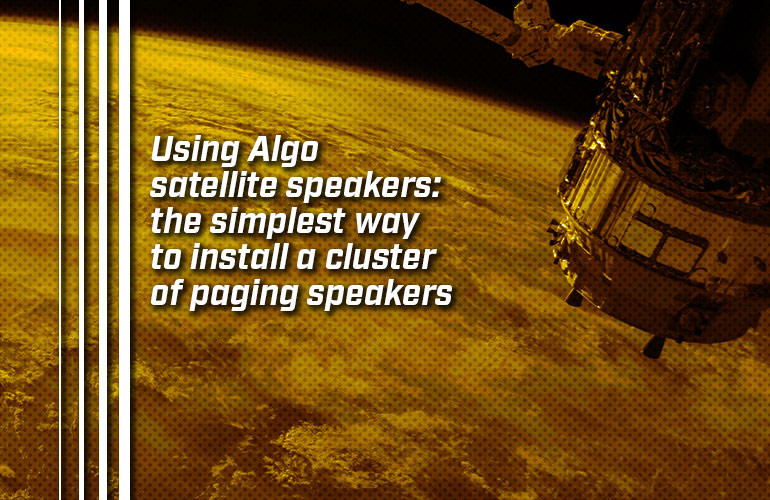Algo Solutions make IP paging devices that really take advantage of what “IP” can enable. Take their recently released paging speakers that simplify the process of installing a cluster of paging speakers:
Both speakers can drive an additional three satellite speakers per “base” speaker:
You daisy-chain the satellite speakers, starting from the dedicated satellite speaker port on the base speaker. You can see the port in this picture of the bottom of an Algo 8196:

The satellite speakers are connected via standard Ethernet cabling, which is relatively inexpensive and doesn’t require an electrician to run, saving on installation costs.
The satellite speakers look the same and produce the same audio quality as the base speakers. The base speakers have a microphone, which can be used to monitor ambient sound levels and automatically adjust loudness to match. The satellite speakers will automatically adjust, the same as the base speaker.
Best of all, you can power all the speakers via PoE+ (Power Over Ethernet) using a PoE switch or PoE injector. And you manage all the speakers, base and satellite, using the web GUI or whatever IP paging system or cloud service you’re using. Algo speakers all support the open SIP communications protocol, so they’re interoperable with a huge range of platforms and services.

All of these features make it much easier to install a cluster of paging speakers for additional coverage. For example, let’s say you wanted to use a bunch of speaker horns in a sports arena. All you need to do is connect the base speaker to a PoE switch, then run Ethernet cable from the base speaker to the first satellite speaker, from the first to the second and the second to the third. You’ve just connected four speakers horn to your IP paging system.
One thing about powering the speakers. A base speaker can handle up to 16W of power. When you add a satellite speaker, that maximum is cut in half for each additional speaker, which can affect sound levels, so you should take that into account.
- 1 speaker = 16W maximum
- 2 speakers = 8W maximum
- 3 speakers = 5.3W maximum
- 4 speakers = 4W maximum

How is Algo 8198 different from Algo 8188? How is Algo 8196 different from Algo 8186?
How are all these speakers different?
Algo 8198 and Algo 8196 differ in function. 8198 is an indoor ceiling speaker with wide sound dispersion. 8196 is an outdoor-rated speaker horn with directed sound dispersion and a more powerful driver. Otherwise, the two have essentially the same specs, so we can cover how they differ from the speakers they replace at the same time.
There are three main differences between the two releases: 8196/8198 and 8186/8188.
- More powerful. The new models have a maximum power of 16W while the old models had a maximum power of 8W.
- PoE+ support. The new models support PoE+ while the old models only supported PoE. This means that the new speakers can handle more power input, allowing them to drive the satellite speakers.
- Satellite speaker ports. The new models can drive satellite speakers and the old ones can’t.

